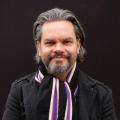
For 124 years, spanning every continent, the heart of the modern Olympic Games have been the spectacular stadia which have hosted the sporting events.
St Albans architect Geraint John, the former head of the GB Sports Council's Technical Unit for Sport, has co-written a new book looking at the story of these remarkable complexes.
Olympic Stadia, which is also authored by journalist Dave Parker, looks at developments in running tracks, the introduction of lighting, improvements in spectator viewing standards and the introduction of roofs.
Geraint, who is the president of St Albans Civic Society, and Dave look at every stadium from Athens 1896 to Tokyo 2020, including plans and photographs.
They consider the changes resulting from the incorporation of the Paralympic Games, the impact on host cities, and the effects of the demands of the world's TV broadcasters.
Geraint explained why he ended up co-writing the book: "I was well established as an expert in stadia design for many years. I jointly wrote a design guide for stadia and I curated two exhibitions on stadia at the Olympic Museum in Lausanne.
"The book brings out two subjects about the contribution which Britain made to the creation of the modern Olympics, and both are little-known to the British public.
"The first is the Wenlock Olympian Games, begun in 1850, created by Dr William Penny Brookes. Baron de Coubertin visited the Games and this influenced him in his creation of the modern Olympics in 1894.
"The second is the contribution made by Sir Ludwig Guttmann, a leading neuro-surgeon who had left Nazi Germany to work at Stoke Mandeville Hospital near Aylesbury. He realised the value of sport and exercise to disabled people. In 1948 , the year of the Olympics in London, he initiated the competitions which led to the creation and development of the Paralympics.
"He is known internationally as the 'Father of the Paralympics', but this is little known in this country."
A special launch event for Olympic Stadia is taking place at Books on the Hill, Holywell Hill, St Albans, on February 28 from 6.30pm.



Comments: Our rules
We want our comments to be a lively and valuable part of our community - a place where readers can debate and engage with the most important local issues. The ability to comment on our stories is a privilege, not a right, however, and that privilege may be withdrawn if it is abused or misused.
Please report any comments that break our rules.
Read the rules here